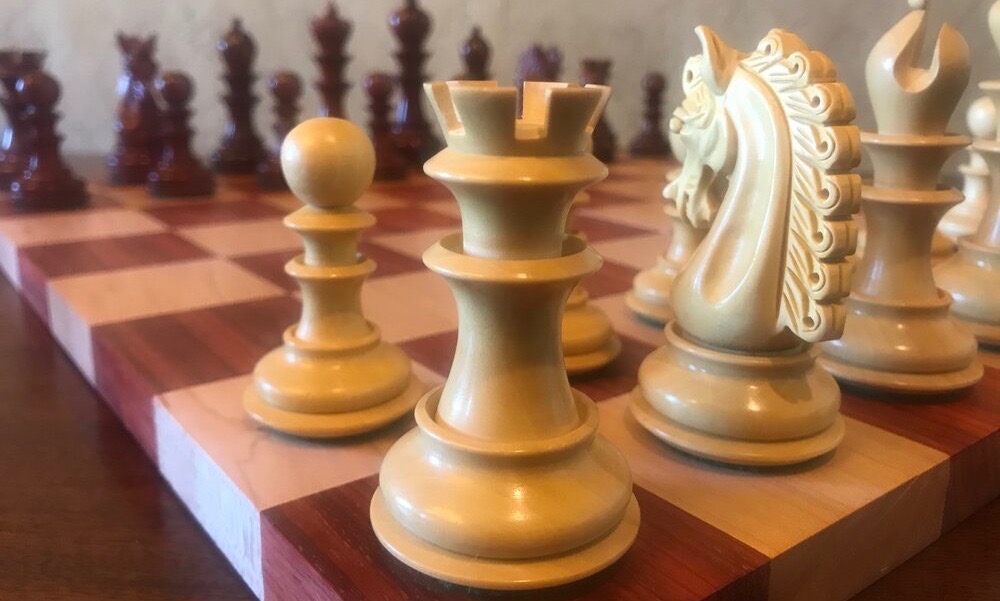
15 Feb The Queen’s Gambit
The first book I can remember owning was Think Like a Grandmaster by Alexander Kotov, which my parents bought for my 16th birthday. At the time I was a keen chess player, thanks to the encouragement of my maths teacher Mr Goodall, who organized a group from his class to learn the game and play regularly against one another.
I went on to join the Wellington Chess Club, which met every Friday evening in town. The venue was little more than a room laid out with tables, chairs and chessboards. It was cosy and possessed its own unique atmosphere of silent contemplation, quiet murmurings and smoke. In those days it wasn’t unusual, during a game, for an opponent to take a drag from their pipe or cigarette and then blow the smoke onto the board, which had the (perhaps desired) effect of interrupting concentration. The smoke partially covered the squares and curled around the chess pieces before being absorbed into the general haze above.
Think Like a Grandmaster was a serious book about becoming a better player. I seem to recall it recommending you take the time to think over 20 steps ahead before making a move. I’m not sure if I ever did, but it encouraged me to be more ambitious in my analysis of chess positions. Under the book’s influence, I improved as a player, competing in chess tournaments and visiting chess clubs in other parts of the country.
These memories returned to me last week as I was watching “The Queen’s Gambit”, a fictional mini-series on Netflix, about a young girl in a 1950s orphanage who is introduced to the game of chess, at which she excels. The story follows her early life, including her battles with addiction and her own self-destructive behavior.
The Queen’s Gambit takes its name from a chess opening. As I watched the series, I remembered other openings I used to study and play: the Sicilian, Ruy Lopez, English, Caro-Kann, French. I also recalled the legendary players of the game, with their exotic names: Alekhine, Capablanca, Keres, Spassky, Fischer, Botvinnik, Morphy, Euwe. I once played former world champion Max Euwe in a simultaneous exhibition in 1974.
“The Queen’s Gambit” centers on the character of Beth Harmon, whose success depends on the encouragement of a host of supporting characters, such as the humble janitor, Mr Shaibel, who teaches Beth how to play, or Harry, who is hopelessly in love with Beth but unable to make her love him back. It is these characters who leave the strongest impression on me. While Beth is making headlines and flying off to Paris and Moscow to play chess, Harry goes to college and supports himself by working as a manager at the local supermarket.
The only unsympathetic people in the mini-series, apart from Beth’s stepfather, are Christians, in the form of two Christian ladies who represent an organization willing to pay Beth’s airfare to Moscow, only if she will speak out against the Marxist-Leninist regime there. The Christian ladies are caricatures, and Beth refuses their money. Although we admire Beth’s integrity, I wondered if the filmmakers were a little biased in favor of the Soviets, especially when you see how beautiful Moscow looked in the movie and how kind and charming all the Russians were.
My own chess career never went very far and I stopped playing chess after going to college. However, late in life my interest was rekindled at Seminary, of all places, where I met another chess enthusiast who was an ordinand. He was very good indeed, and played in tournaments in Europe during his holidays. He always beat me, but sometimes he would offer to play “blindfold” – i.e. with his back to the board, which gave me the chance to draw with him from time to time.
What would my friend have made of “The Queen’s Gambit”? I am sure he would have said, “It’s all a fantasy.” But in one sense the mini-series had it right: it showed how the understanding, support and sympathy of others can help a person overcome their demons, both personal and professional. The real Christians – not the fictional ones in the movie – are people like that.
With every blessing
Father David




No Comments